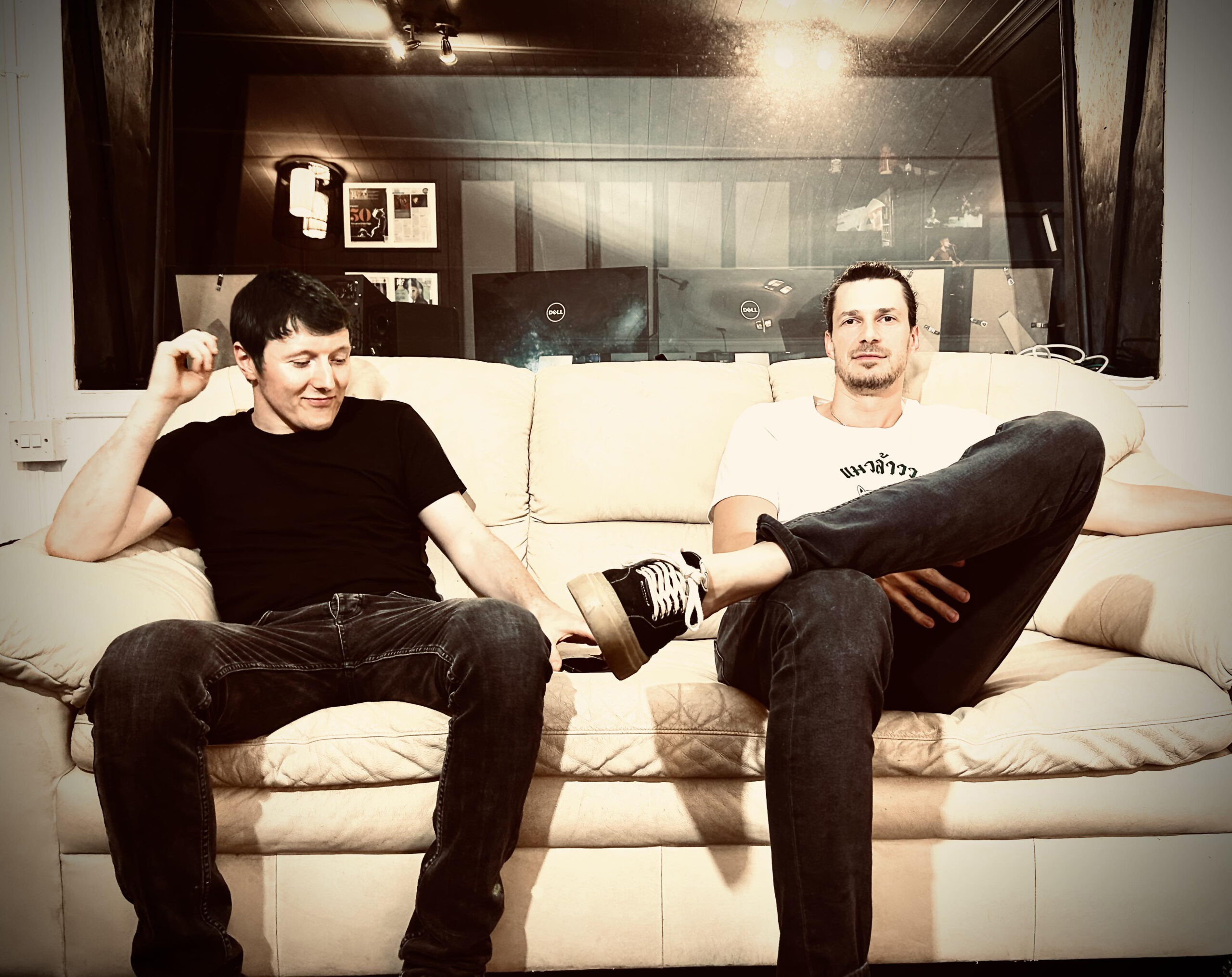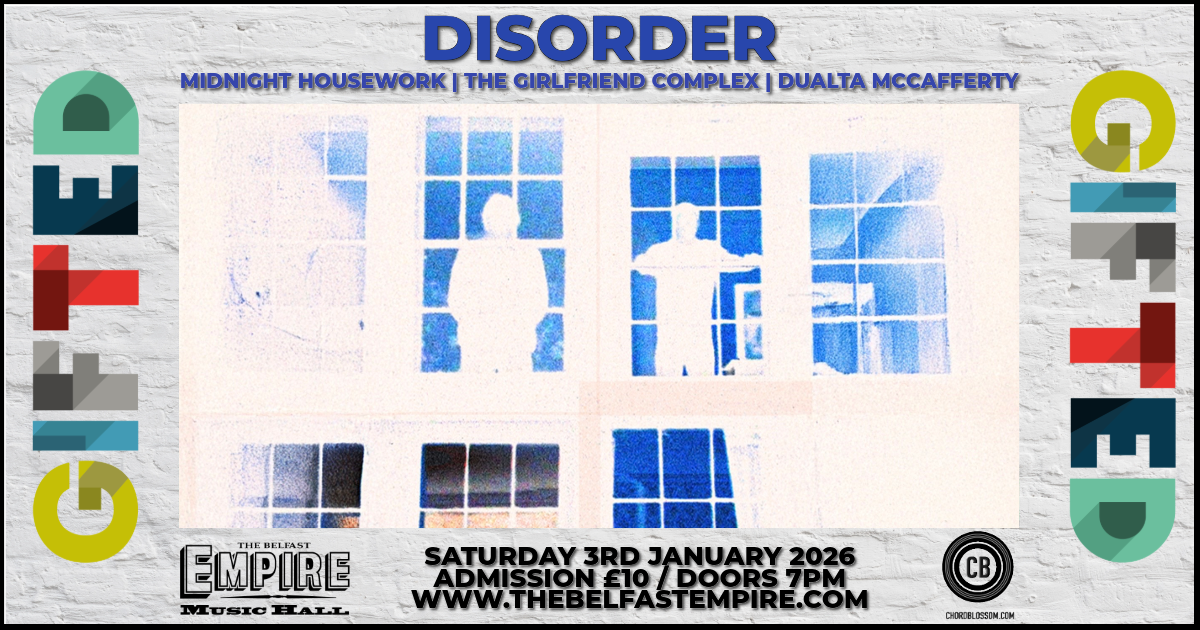Unquiet Nights have been around longer than us which is saying something. Their debut album 21st Century Redemption Songs appeared a month before Chordblossom debuted back in 2012.
Fast forward twelve years to the present day and they are back with their third full length record, Seasons In Exile. It was recorded at Credential Sound, with additional recording at Manor Park Studio before being mixed & mastered by Neal Calderwood.
Luke Mathers took some time out of his busy schedule to give us a run through of each track on the record.
Diamond and the Missing Son
The whole idea for the third album Seasons In Exile came out of the song ‘Diamond and the Missing Son’. It’s the only older song on the album, in fact it predates Unquiet Nights with demos floating around from several years before our first album.
At some stage someone close to the band inadvertently synced their iTunes account to the Last.fm database, which meant the title of that demo started listing on our page as one of our songs. We have this super-fan who became obsessed with being able to hear this song, and asked about it for a long time, so one day in our studio after doing a bunch of other songs we tried it to see how it might sound now. We were surprised how easily it sounded like “a record” without much extra effort, so we took it to Manor Park for a couple of overdubs and have the song mixed at the end of a session unrelated to Seasons In Exile.
The whole process was way faster than normal. Even Neal at Manor Park remarked how easily “Diamond…” came together, which is always a positive sign. After hearing that the result sounded pretty good, I challenged myself to expand the story of the characters in ‘Diamond and the Missing Son’ over nine more songs. I hoped this process would produce some new songs that wouldn’t have happened without a definite concept in place.
Break Through The Waves
‘Break Through The Waves’ starts setting out more of the background to the characters introduced in ‘Diamond and the Missing Son’. We’ve been happy to see positive early coverage of this song, and some decent radio play in the US & UK, because we weren’t sure before releasing it how it would be received. Normally topics as heavy as this will fail to get covered by media.
The song explains why the main character is simply referred to as ‘The Missing Son’ throughout the album, which is because he is forced to leave his family on account of domestic violence. When I was starting to get into music, Genesis had a single in the Top 10 called ‘No Son of Mine’ which dealt with this topic. It really resonated with me back then, and helped me understand the world a bit. I wanted one day to be brave enough to write about the topic, or maybe have enough relative “success” in terms of already having had a bunch of songs on the radio that if starting to write about more controversial topics would torpedo our presence, it didn’t really matter anymore.
Maybe it’s flawed thinking, but that was my mindset going into it and what motivated the song writing. These topics had already been hinted at in several of our better known songs before with ‘George Best City’, and ‘Four Winds’, but this is the first time I decided to hit it right on the nose.
Snake Handler
The thing about Seasons In Exile is that it’s the first album where we’ve had our own studio to record in. We call it Credential Sound, and the best thing about having your own studio is that there is no time constraint. When we have particular equipment set up we can just leave it that way, and keep trying different ideas without having to cut the idea short because of cost.
We would leave Pro Tools recording and jam new ideas and songs way past where you’d normally stop in a professional studio. Sometimes a song idea would be going 20 minutes before a sudden change in key, or time signature would just happen, and a whole new song would appear.
With ‘Snake Handler’, there are some mad guitar parts including the section at 2:40 that we only ever played once and just left them in the way they happened. If we ever play it live, I will need to learn what actually got recorded there. ‘Snake Handler’ came out of one of these extended improvs that were originally supposed to be a different song. The lyric has a lot of different Easter eggs hidden in there too, which will always mean something to me when I hear it.
Sting In The Tail
What happened with ‘Sting In The Tail’ was that near the end of the album’s recording, Rodger was going back to Thailand for an extended period, and it was going to be his last day at the studio for quite a while. I had this track with the chord changes sketched in with a palm muted guitar as the guide, and some Mellotron pads to give it a depth. The chorus vocal was already there and the pre-chorus like it is now on the album, but there were no verses written.
Rodger seemed to respond to this track in the studio, and made some positive noises about it while the drums were coming together, so I took that as the green light to finish the verses in time to get it on the album. The lyrics are more backstory into what drove the main character on the album to have his particular set of motivations in life.
Things Could Be So Good For You
‘Things Could Be So Good For You’ is a conversation between the two main characters on the album. It happens when they are both in a city thousands of miles from home. They have very weak prospects in life at the point in time when the song is taking place.
Although the story of the album is set against the backdrop of some very dark factors, I personally will always view these tracks as extremely positive in their outlook. It’s about the singular moments of victory that can be taken amidst the struggle that life is for many people. They are talking about the fact that they don’t have to accept their start in life, and don’t have to listen to negative predictions about how things are going to turn out for them. Self-determination can change that course.
Musically it came together easy enough, and I remember people close to the band responding positively about it. There’s a bridge later in the song that wasn’t there when we brought it to Manor Park, I remember re-writing it in the drum room and getting Neal to add that bridge section into the song during the mixing. It seemed to add more drama and make the chorus stand out more. The song itself seemed to have a chance of getting included on playlists and draw more attention to the album. You need those kind of tracks.
This Is My Oxygen
‘This Is My Oxygen’ was a guitar lick and chord progression I would end up playing if we were sitting about waiting somewhere and I had a guitar in my hands. It took years before it got a set of lyrics written for it. If you hear it on guitar by itself, it sounds like a country thing, but it probably doesn’t sound like that now on the final version.
Story wise, the missing son character has decided he needs to take his life into a suitcase and go somewhere he thinks he can realise a talent he has. This represents the feeling that the circumstances of his life are so precisely rigged against him, that only by taking some big calculated risks and having those turn out successfully, can he give himself a chance to overcome his uneven start to life. There are loads of reflections about where he came from, and the patterns he sees that he has to break. I tried to stack his physical surroundings with as much metaphor as possible.
You Are My Wilderness
The Genesis influence probably kicked off ‘You Are My Wilderness’ again. It was a skeleton track I had laid out using Mellotron voice tapes. A lot of times I end up removing the synth pads after the guitars are recorded but this time I wanted to let that sound be the main colour on the track. I wanted to let the bass line be more of a lead instrument on this, and in fact my guitar is mostly just stabbing rhythmically to support that instead of there being much lead work. Maybe it’s our version of The Who, or something along those lines.
There is one short solo on it, which was the original live improv at the time of recording the drums. It was an unusual phrase that happened spontaneously and sounds like it was phrased backwards, so seemed to deserve being on there. The character is contemplating the role of luck versus design in his life, not supernatural design but his own ability to influence his outcome. He recalls the memory of a dead relative in the song too, as if to add extra gravity to his situation by convincing himself he needs to reach a positive outcome and justify their faith placed in him on top of his own expectations.
High Conviction Play
The last song written for Seasons In Exile was ‘High Conviction Play’, with the purpose of leading directly into the final two songs in sequence. The whole point was that I wanted a shock cut like a movie.
The listener thinks they’re being lead into another chorus after the third verse, but no, the guy is sitting awake listening to hungry dogs howling in the street outside where he’s staying and he’s contemplating that in life “Sometimes it seems like everything comes down to just one shot”. And then bang! Straight into ‘Just Another Sun Going Down’.
It wasn’t something we ever played in the studio, I remember piecing ‘High Conviction Play’ together from bits of drumming Rodger did on a different song and then writing the new song over it as a way of creating the lead in to the finale of the album.
The long reverb tail on the word “Shot….” to end the song, and having it on it’s own with no other instruments is deliberate too. I wanted to make it seem like a massively important realisation to the guy in the song, and that he is alone with his thoughts to contemplate how important the next moments of his life are going to be.
Just Another Sun Going Down
A lot of the album up to this point was prequel in the story, as in conversations remembered and events that happened at an earlier time. By the time of ‘Just Another Sun Going Down’, the narrative is back in the present tense, and the characters are celebrating on the roof of a tall building.
They have just done something that will greatly affect the outcome of their lives in a positive way. It was hugely against the odds, but they made it happen anyway. They know that where they are currently is a place they will never see again. They toast to the few people in their lives who they feel were on their side, and in equal part celebrate that the people who enjoyed watching the hardship in their life and made negative predictions about them were proven completely wrong.
They finish the toast as the sun is setting, drop the glass bottle from a great height into a dumpster and watch it smash, and then leave forever.
Thuja Green
The end point of Seasons In Exile was always supposed to be ‘Thuja Green’. It was the next song written after ‘Diamond and the Missing Son’ was finished, like having two book ends at the start and end of the album. The reason for the title is that the two characters are watching their reflection in a stream at the bottom of a property lined with Thuja Green Giant trees.
The missing son sees his reflection in the stream and realises he doesn’t regret any of the risks he took getting to this point in his life. The first line also starts off by posing the main question I wanted to explore on the album. “Everyone got to choose, what they want, and what they want to lose?”
What are your priorities in life, and how many smaller sacrifices are you willing to make in order to actually reach the big things that will really make a difference as your life goes on?
All the songs on Seasons In Exile are an examination of this question.








